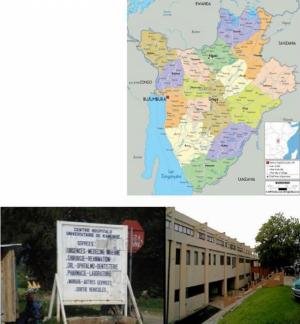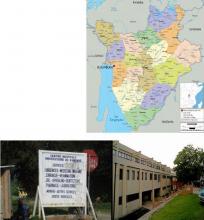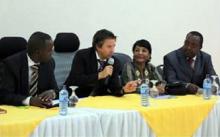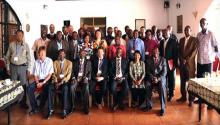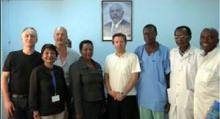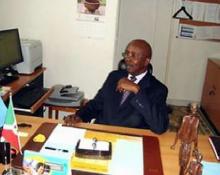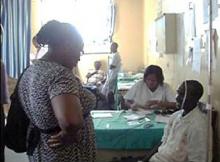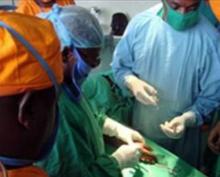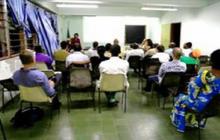WHO-MOH Meeting Integrated Management for Emergency & Essential Surgical Care 7-11 April 2013 Bujumbura
Burundi is a landlocked country in the Great Lakes region of Eastern Africa, bordered by Rwanda to the north, Tanzania to the east and south and the Democratic Republic of the Congo to the west. It has a population of 8.383 million (2011) and is divided into 17 provinces, 117 communes.
The provision of healthcare is unevenly spread, with more than 70% of doctors concentrated in Bujumbura, while many of the health centers have been destroyed completely or in part by the 1993- 2000 conflict.
The 1993-2000 conflict has resulted in the destruction and lack of maintenance of health centers, water and sanitation facilities. It is estimated there is one center per 25000 inhabitants. In Burundi, the process of structuring the country into health districts began in 2007. (Ministry of Public Health, Burundi 2011).
The WHO Emergency and Essential Surgical Care (EESC) program aims at strengthening capacities particularly at first referral health facilities towards strengthening health systems and established a global forum: WHO Global Initiative for Emergency and Essential Surgical Care (GIEESC). The WHO Integrated Management on Emergency and Essential Surgical Care (IM EESC) toolkit (www.who.int/surgery) provides guidance on development of evidencebased policies and plans, training curriculum, emergency equipment, needs assessment, teaching tools, best practices in trauma, HIV prevention, and obstetrics and in disaster situations.
Objective: Facilitate the applicability of WHO Integrated Management for IMEESC toolkit is for improving surgical care systems.
- WHO Emergency & Trauma Care training course resource modules for frontline health providers.
- Collaborations and partnerships with for strengthening surgical capacities through WHO GIEESC.
- Meetings with the directors of the following health facilities: -Buja Maire Sud (District Health Centre) Universitaire Hospital Kamenge, Bujumbura.
- The WHO GIEESC brings together multidisciplinary stakeholders (health authorities, academia, NGOs, professional societies, health professionals) to support access to life-saving and disability preventive surgical care through collaborations and partnerships. The 2nd Chance.
- Swiss Surgical Association is a member of the WHO GIEESC. Surgical Care training workshop was conducted in the University Hospital Kamenge, Bujumbura, by the 2nd Chance Swiss Surgical Association jointly with MOH Burundi and in collaboration with the WHO GIEESC towards disability–preventive reconstructive surgical care in the management of burns contractures and trauma, ulcers and congenital anomalies.
Participants included surgeons from academia, teaching and district hospitals from 9 African Countries (Burundi, Benin, Chad, Congo, DRC, Mauritius, Morocco, Tanzania, and Rwanda).
Ministry of Health (MOH) Burundi, Director General welcomed the participants. He thanked the 2nd Chance Swiss
Surgical Association for including Association of Burundi Surgeon Association (ABUC) for the training of plastic surgery and for the partnership between them.
Participants were facilitated to the applicability of the WHO IMEESC toolkit and the WHO Emergency & Trauma Care (ETC) towards improving the surgical care systems.
Meeting Presentations and Discussions:
Meeting participants included policy makers (ministry of health, ministry of education), directors and experts from academia, members of professional societies (surgical, anesthesia, orthopedics, obstetrics, pediatrics’, and nursing) and health providers at all levels of health facilities.
- The WHO IMEESC toolkit was presented to the Hon. Minister of Health Burundi and WHO country representative. The role of strengthening Emergency & Essential Surgical Care in Burundi was discussed with evidence-based planning. This would benefit relevant programs for MDGs, emergency preparedness through assessment of the surgical capacities in district and sub-district level health facilities and implementation of best practices to improve quality of EESC towards universal health coverage.
- Improving quality & safety of surgical care: norms and standards at various levels of care, best practice implementation at point of care (wards, operating room, postoperative and emergency room, labour room, ICU), monitoring and evaluation of progress and outcome of training.
- Accessibility to education and training tools are required to improve life-saving and disability-preventable surgical interventions in management of injuries, pregnancy-related complications and other surgical conditions.
- Assessment of surgical care the health facilities provide the first evidence based snapshot for countries.
- The French adaptation Pratique Chirurgicale De Base (PCB) of the WHO manual Surgical Care at the District Hospital (SCDH) but the WHO IMEESC toolkit requires translation.
- Several African countries lack specialists at district hospitals and the WHO ETC training course resources (5 modules with emphasis on injuries in women, children and elderly) will be incorporated for strengthening frontline health providers (non-specialist doctors, nurses, clinical officers) in rural and remote areas.
- Countries will utilize the WHO IMEESC toolkit teaching and training tools (slides, evaluation, videos, workshop agenda and report) and the contents will support faculty and busy clinicians for conducting training at various levels of care.
Recommendation:
- Follow-up for surgical capacity assessment utilizing the WHO EESC situation analysis tool (French version) for data entry into the WHO EESC global database and link to the national database to allow evidence-based planning to improve surgical care system.
- Follow up on the WHO Monitoring & Evaluation tool from the WHO IMEESC toolkit to assess progress and impact of surgical training by Swiss Foundation 2nd Chance Reconstructive Surgery.
- Plan to disseminate the WHO PCB for participants in the 9 countries.
- WHO IMEESC toolkit with the WHO ETC training course resources will be translated for incorporation of WHO surgical care standards including Primary Surgical Care package and Essential Emergency Equipment list and guidance on training curriculum for various levels of care and pre-service training. - Prepare and send draft report on the WHO-MOH Meeting on Integrated Management for Emergency &
Essential Care and Training Workshop on Surgical Care towards wider dissemination.
Meeting Participants
Name and country
1. Dr Karayuba Richard : Burundi
2. Dr.Ndabashinze Pontien : Burundi
3. Dr.Ndarugirire François : Burundi
4. Dr.Mbonyingingo Canisius : Burundi
5. Dr Nkesha Theophile : Burundi
6. Dr.Ndayishimiye Jesus Marie Joseph : Burundi
7. Dr.Habimana Lin : Burundi
8. Dr.Agbessi F. Odry-: Benin.
9. Dr.Opango Ch idas Lucile : Congo-Brazzaville
10. Dr. Oudrangbi Djonga : Chad
11. Dr.Mahanat Nour Abderahim : Chad
12. Dr.Zabre Serge Eric : Côte d’Ivoire
13. Dr.Manga Otomba Jean de Dieu : DRC
14. Dr.Kabangu Jean Marie : DRC
15. Dr.Chabbak Hakim : Morocco
16. Dr.Alaoui Mehdi : Morocco
17. Dr.Siborurema Laurent : Rwanda
18. Dr.Bayisenga Justin : Rwanda
19. Dr.Gasaganya Seraphin : Rwanda
20. Dr.Ntakiyiruta Georges : Rwanda
21. Dr.Lollbeehary Kisham : Mauritius
22. Dr.Musolas Alberto Spain
23. Dr.Quindoz Pierre : Switzerland
24. Dr.Du mont Lionel : Switzerland
25. Dr.Balague Nicolas : Switzerland
26. Dr.Gold Benjamin : Switzerland
27. Dr.Pechere Marc : Switzerland
28. Mrs Anne Zeidan : Switzerland
OFFICE OF SWISS COOPERATION
Dr Donatien Nkurunziza ::Burundi
MINISTRY OF HEALTH
1. Dr. Sabine Ntakarutimana::Ministry of Health Bujumbura, Burundi.
2. Dr Liboire Ngirigi::Ministry of Health Bujumbura, Burundi
WHO
1. Dr. Babacar Drame: WHO, Representative. Burundi
2.Dr. Jerome Ndaruhutse: DPC ,WHO Burundi
3.Dr. Meena N. Cherian: WHO, HQ, Geneva, Switzerland



